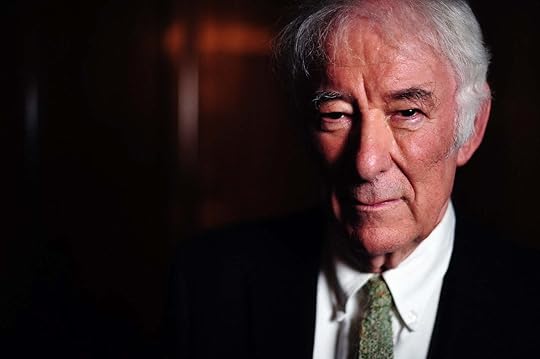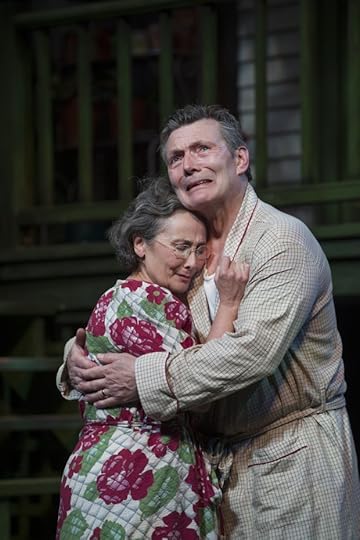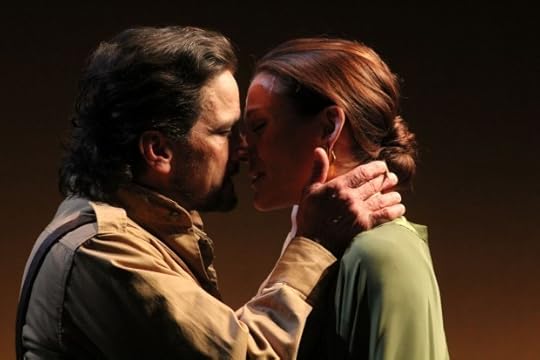Terry Teachout's Blog, page 59
September 1, 2013
TT: Almanac
Virgil Thomson, foreword to E. Robert Schmitz, The Piano Works of Claude Debussy
BLUES FOR MISTER CHARLIE
August 30, 2013
TT: Seamus Heaney, R.I.P.
* * *
Professional productions of the Greek tragedies seem to be growing less common in America--the last time I reviewed one was in 2008--and so American Players Theatre's revival of "The Cure at Troy," Seamus Heaney's adaptation of Sophocles' "Philoctetes," is of interest for that reason alone. But APT's staging, directed by David Frank, the company's artistic director, is no curiosity. It is, in fact, an overwhelming theatrical experience, a show whose emotional impact is nothing short of shattering. If you're fortunate enough to see it, you'll remember it for as long as you remember anything.
 "Philoctetes," in which Sophocles dramatized the myth of the wounded Greek warrior (David Daniel) who was deserted by Odysseus (Jonathan Smoots) and his comrades, was largely forgotten save by classicists when Mr. Heaney published his English-language adaptation in 1991, four years before he won the Nobel Prize. "The Cure at Troy" is a masterly piece of versification, at once unpretentious in diction and elevated in tone. Without distorting the play's meaning, Mr. Heaney has subtly emphasized its continuing relevance, placing lines in the mouths of the chorus that liken the furious Philoctetes' self-consuming desire for revenge to the irredentist madness of Northern Ireland, the land of the poet's birth: "So hope for a great sea-change/On the far side of revenge./Believe that a further shore/Is reachable from here."
"Philoctetes," in which Sophocles dramatized the myth of the wounded Greek warrior (David Daniel) who was deserted by Odysseus (Jonathan Smoots) and his comrades, was largely forgotten save by classicists when Mr. Heaney published his English-language adaptation in 1991, four years before he won the Nobel Prize. "The Cure at Troy" is a masterly piece of versification, at once unpretentious in diction and elevated in tone. Without distorting the play's meaning, Mr. Heaney has subtly emphasized its continuing relevance, placing lines in the mouths of the chorus that liken the furious Philoctetes' self-consuming desire for revenge to the irredentist madness of Northern Ireland, the land of the poet's birth: "So hope for a great sea-change/On the far side of revenge./Believe that a further shore/Is reachable from here."Not surprisingly, "The Cure at Troy" was taken up by drama companies throughout the English-speaking world, but it has been a number of years since it last received a noteworthy American production. Fortunately, this modern-dress version, which is being performed by a cast of six in APT's gemlike 200-seat thrust-stage indoor theater, is completely worthy of the play. Mr. Frank and Robert Morgan, who designed the set and costumes, have presented "The Cure at Troy" with the utmost simplicity. The scene is a barrel-strewn waterfront that bears an eerie resemblance to a jigsaw puzzle. In this desolate space, Messrs. Daniel and Smoots vie for the loyalty--and the soul--of Neoptolemus (Paul Hurley), a young soldier who is torn between patriotic duty and personal honor. No more than Sophocles or Mr. Heaney does Mr. Frank seek to simplify Neoptolemus' dilemma, and it is precisely because of this hard honesty that the divine illumination that ends the play carries the wrenching force of true revelation.
Three of the cast members are part of APT's resident ensemble, and they give performances so compelling that you'll want to hold your breath each time they speak. Mr. Daniel's Philoctetes is a coolly urbane gentleman-warrior whom pain has reduced to a shrieking shadow of himself. Mr. Smoots's Odysseus is a rich-voiced cynic who is quick to heed the reassuring call of expediency. And Sarah Day, the leader of the three-woman chorus, narrates the unfolding tragedy with the world-weary wisdom of one who knows in her bones that understanding and forgiveness are not the same thing.
All three, like Mr. Frank and the other members of the cast and production team, have placed their talents wholly in the play's service. As a result, Mr. Heaney's most telling lines come across so clearly, even nakedly, that you can hear the audience gasping with the shock of recognition ("War has an appetite/For human goodness but it won't touch the bad"). Anyone who doubts the permanent significance of the classics should pay heed to those gasps. It says much about man's unchanging nature--and the miraculous power of art to efface time and space--that they should be provoked by a play that was first performed more than 2,000 years ago.
August 29, 2013
TT: A Wisconsin tragedy
* * *
 "All My Sons," the 1947 play in which Arthur Miller told the tragic tale of a small-town family that has lived with lies for too long, isn't a masterpiece--it's too preachy for that--but it's written with an uncomplicated plainness that makes much of Miller's later work, "Death of a Salesman" included, sound overwrought by comparison. Do it naturalistically and straightforwardly and you can't miss. Add a pinch of understated imagination and the results will be even better. William Brown's American Players Theatre production scores big on both counts, and also features a superior cast led by Jonathan Smoots and Sarah Day, two veteran members of APT's permanent core ensemble who outdo themselves this time around.
"All My Sons," the 1947 play in which Arthur Miller told the tragic tale of a small-town family that has lived with lies for too long, isn't a masterpiece--it's too preachy for that--but it's written with an uncomplicated plainness that makes much of Miller's later work, "Death of a Salesman" included, sound overwrought by comparison. Do it naturalistically and straightforwardly and you can't miss. Add a pinch of understated imagination and the results will be even better. William Brown's American Players Theatre production scores big on both counts, and also features a superior cast led by Jonathan Smoots and Sarah Day, two veteran members of APT's permanent core ensemble who outdo themselves this time around.What makes their performances so striking is the doubleness of character that they suggest. Mr. Smoots plays Joe Keller, a factory-owning wartime profiteer whose corner-cutting, which led to the deaths of 21 American pilots, is about to be unmasked. On the surface he's an ingratiating back-slapper, but scratch his good cheer and you'll find stark terror. Not so Kate (Ms. Day), his wife, whose grandmotherly exterior conceals a Medea-like hardness of soul that is nothing short of terrifying....
 Small-cast Shakespeare stagings are very much the fashion these days, and Kate Buckley's "Antony and Cleopatra" is one of the best I've seen, a seven-actor chamber adaptation by Ms. Buckley and James DeVita in which everything peripheral to the central relationship between the title characters (incisively played by Mr. DeVita and Tracy Michelle Arnold) has been ruthlessly and creatively stripped away. What emerges from the cutting is a terse, tightly focused parable of the power--and price--of physical obsession....
Small-cast Shakespeare stagings are very much the fashion these days, and Kate Buckley's "Antony and Cleopatra" is one of the best I've seen, a seven-actor chamber adaptation by Ms. Buckley and James DeVita in which everything peripheral to the central relationship between the title characters (incisively played by Mr. DeVita and Tracy Michelle Arnold) has been ruthlessly and creatively stripped away. What emerges from the cutting is a terse, tightly focused parable of the power--and price--of physical obsession....Mr. DeVita, it turns out, is as good a playwright as he is an actor. His "Dickens in America," for instance, is a one-man show in the style of Hal Holbrook's "Mark Twain Tonight!" whose conceit is ingenious: The audience is invited to imagine that it's present at Charles Dickens' last public reading of excerpts from his novels, in the course of which he interpolates reminiscences that are shadowed by his awareness of his fast-approaching death. James Ridge is a slender, sprightly Dickens...
* * *
Read the whole thing here .
TT: More than a radio star
* * *
When Marian McPartland died last week at the age of 95, the obituaries devoted roughly equal time to her career as a jazz pianist, her second career as the founder and longtime host of NPR's "Piano Jazz" and the fact that she was a woman. That's fair enough: "Piano Jazz" was the most influential jazz program in the history of American network radio, and McPartland came to fame at a time when you could still count the number of successful women jazz instrumentalists on the fingers of one hand. But the flood of tributes failed to make clear what her admirers had always known, which was that she was a performer first and foremost, a soloist of strong personality and real quality whose shimmering, iridescent harmonies were instantly distinctive. "Piano Jazz" may have made McPartland famous, but it was her playing that made her important.
McPartland always made a point of playing duets with her guests on "Piano Jazz" (on which she interviewed everyone from Dave Brubeck to Steely Dan). The chameleon-like ease with which she accommodated their varied styles could suggest to casual listeners that she had no style of her own. Nothing could have been further from the truth: Never for a moment did she submerge her own quiet yet unmistakable individuality. Nor should she have done so, for she worked unremittingly hard to develop it, much harder than most of her fans realized.
Born in England in 1918, McPartland was a classically trained prodigy who became interested in jazz as a teenager. Not until 1944, though, did she work for the first time with an American jazzman, the cornetist Jimmy McPartland, a Bix Beiderbecke protégé whom she married and with whom she moved to the U.S. after World War II. There she heard bebop and turned herself into a thoroughly modern jazz soloist. In 1952 McPartland and her trio began an eight-year residency at the Hickory House, a popular New York restaurant that was one of Duke Ellington's favorite hangouts. At length she got up the nerve to ask Ellington what he thought of her playing. His reply was elegantly and charcteristically enigmatic: "You play so many notes." Eventually it hit McPartland that he wasn't paying her a compliment: "After a while I thought, 'He probably is telling me I'm playing too many.' It was one of the best criticisms I ever had."...
* * *
Read the whole thing here .
Marian McPartland plays her arrangement of Bix Beiderbecke's "In a Mist" in 1974:
TT: Almanac
Mary Karr, interview, The Paris Review (Winter 2009)
August 28, 2013
TT: Almanac
Mary Karr, interview, The Paris Review (Winter 2009)
TT: So you want to see a show?
Here's my list of recommended Broadway, off-Broadway, and out-of-town shows, updated weekly. In all cases, I gave these shows favorable reviews (if sometimes qualifiedly so) in The Wall Street Journal when they opened. For more information, click on the title.
BROADWAY:
• Annie (musical, G, reviewed here)
• Matilda (musical, G, all performances sold out last week, reviewed here)
• Once (musical, G/PG-13, nearly all performances sold out last week, reviewed here)
• The Trip to Bountiful (drama, G, closes Oct. 9, reviewed here)
OFF BROADWAY:
• Avenue Q (musical, R, adult subject matter and one show-stopping scene of puppet-on-puppet sex, reviewed here)
• The Fantasticks (musical, G, suitable for children capable of enjoying a love story, reviewed here)
IN NIAGARA-ON-THE-LAKE, ONTARIO:
• Faith Healer (drama, PG-13, closes Oct. 6, reviewed here)
• Major Barbara (drama, PG-13, closes Oct. 19, reviewed here)
• Our Betters (comedy, PG-13, closes Oct. 27, reviewed here)
IN ASHLAND, OREGON:
• My Fair Lady (musical, G, closes Nov. 3, reviewed here)
CLOSING SOON OFF BROADWAY:
• The Weir (drama, PG-13, extended through Sept. 15, reviewed here)
CLOSING FRIDAY IN GARRISON, N.Y.:
• All's Well That Ends Well (Shakespeare, PG-13, reviewed here)
CLOSING SATURDAY IN GARRISON, N.Y.:
• King Lear (Shakespeare, PG-13, reviewed here)
CLOSING SUNDAY IN PETERBOROUGH, N.H.:
• Absurd Person Singular (serious comedy, PG-13, reviewed here)
TT: Listen up, eggheads!
 I rejoice to report that an excerpt from
Satchmo at the Waldorf
, my first play, will appear in the Fall 2013 issue of Daedalus, the journal of the American Academy of Arts and Sciences. It's a special American-music issue guest-edited by Gerald Early, and it'll be the first time that any part of Satchmo has appeared in print, as well as my first appearance in the pages of Daedalus.
I rejoice to report that an excerpt from
Satchmo at the Waldorf
, my first play, will appear in the Fall 2013 issue of Daedalus, the journal of the American Academy of Arts and Sciences. It's a special American-music issue guest-edited by Gerald Early, and it'll be the first time that any part of Satchmo has appeared in print, as well as my first appearance in the pages of Daedalus.The excerpt is prefaced by an author's note called "Satchmo's Shadow":
Writing the biography of a performing artist is like standing in the wings to watch a play. You see what the public sees, only from a different perspective. Pops: A Life of Louis Armstrong, my 2009 biography of the greatest jazz musician of the twentieth century, is about the much-loved genius-entertainer who made millions of people feel warm inside--but it's also about the private Armstrong, who swore like a trooper and knew how to hold a grudge. The fact that Satchmo (as he liked to call himself) had two sides to his personality doesn't mean that the public man was somehow less "real" than the private one. Like all geniuses, Armstrong was complicated, and that complexity was part of what made his music so beautiful and profound.
Biography is about telling, theater about showing. Having written a book that told the story of Armstrong's life, it occurred to me that it might be a worthwhile challenge to try to show an audience what he was like offstage. This was the seed from which Satchmo at the Waldorf grew....
Just in case you were wondering, all four-, seven-, and twelve-letter words will be printed IN THEIR ENTIRETY.
For more information about the issue, go here .
TT: Another bull's-eye for Duke
 I've just seen the latest pre-publication review of
Duke: A Life of Duke Ellington
. Written by James E. Perone, it'll appear in the Sept. 1 issue of
Library Journal
. Here's an excerpt:
I've just seen the latest pre-publication review of
Duke: A Life of Duke Ellington
. Written by James E. Perone, it'll appear in the Sept. 1 issue of
Library Journal
. Here's an excerpt:Although Ellington wrote an autobiography (Music Is My Mistress) and has been profiled in several other books over the years, few of these get at the complexity of Ellington's private life and his personality as a bandleader. Teachout's writing is clear, the facts seem to be well supported both from previously published sources and from interviews, and some of the awareness that the author provides (e.g., the extent to which Ellington was a collaborative composer who used ideas from his band members) will expand readers' view of the man who was perhaps the greatest jazz composer of the 20th century. Photographs sprinkled throughout are well chosen to provide support to Teachout's points in the text....Teachout gives much insight into Ellington's life, personality, working habits, and compositions. This work should appeal to Ellington enthusiasts as well as casual jazz fans.
So far, the reviewers really seem to be getting what I was trying to do, for which much thanks.
Terry Teachout's Blog
- Terry Teachout's profile
- 45 followers



